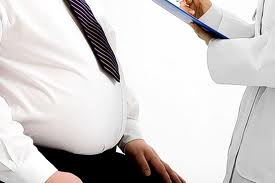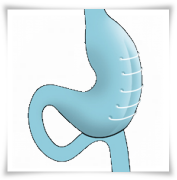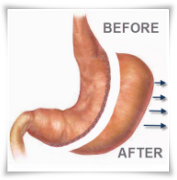Weight Loss Surgery Side Effects
Weight loss surgery is the best choice for extremely obese patients, but there are weight loss surgery side effects that can occur. Surgery can be completely successful, but even the most successful patients still experience some weight loss surgery side effects to a certain extent.
The degree of the side effects will depend on the type of weight loss surgery you undergo, but some of the weight loss surgery side effects can include things such as hair thinning, dehydration, vitamin deficiency and others.
Here we will go over some of the more common weight loss surgery side effects that you may experience.
Click here to read more about the Gastric Sleeve.
Common Weight Loss Surgery Side Effects
 Here are some of the more common weight loss surgery side effects you may experience after undergoing a bariatric procedure:
Here are some of the more common weight loss surgery side effects you may experience after undergoing a bariatric procedure:
- Nausea and Vomiting
- Dehydration
- Hair thinning
- Excess and/or Saggy Skin
- Cold Intolerance
- Food Intolerance
- Vitamin Deficiency
Weight Loss Surgery Side Effects – The Details
Nausea and Vomiting
Nausea and vomiting are weight loss surgery side effects that can usually occur within the first 3 months following the procedure. This is during the time that patients are becoming accustomed to their new eating habits and the new diet. If you feel full then you should stop eating, because if you don’t you will most likely end up vomiting which may lead to other complications. This can be avoided by listening to your body, if you feel full then stop eating. Also, you should eliminate tough, dry foods from your diet as these can also cause these to uncomfortable weight loss surgery side effects.
Dehydration
Dehydration after surgery can occurs due to insufficient water intake, so make sure you stay well hydrated after surgery. Dehydration can lead to much more serious weight loss surgery side effects that will require hospitalization. Dehydration may also lead to vomiting and nausea, and if this is persistent it can also cause electrolyte imbalance as well as vitamin deficiency. Dehydration can also have a negative effect on your gall balder and your kidney. Symptoms of dehydration can include dizziness, fatigue, lower back pain, dark colored urine, and a whitish coating on your tongue. It is recommended to drink a minimum of 64 ounces of water and/or other fluids every day. In the case that the patient is too nauseous to drink, then sucking on ice is recommended.
Hair Thinning
Transient hair thinning is not one of the common weight loss surgery side effects provided you stick to your diet, but it may be expected between 2 – 10 months following the surgery. This is due to a nutritional deficiency which may be minimized or remedied by taking nutritional supplements and multivitamins that contain zinc and biotin to help maintain an adequate protein intake. Hair thinning and/or hair loss is one of the temporary weight loss surgery side effects, and the lost hair will gradually grow back.
Excess and/or Saggy Skin
Excess or saggy skin is one of the typical weight loss surgery side effects if you lose weight very quickly. This will usually happen in the areas around the thighs, the upper arms and the breasts. Although it is a sign that the weight loss is progressing, it can become a problem for the patient. Excess skin tissue can cause skin reactions, cosmetic discomfort, and even functional limitations. The best way to remedy this problem is to undergo a cosmetic procedure to tighten the skin, and remove excess skin.
Cold Intolerance
This condition can occur, and is the result of the loss of body fat which insulates you, as well as a change in metabolism. Patients can begin to feel cold easily as they begin to lose weight.
Food Intolerance
Food Intolerance is another one of the potential weight loss surgery side effects. Foods that are sticky, dry, stringy, or gummy are usually the culprits. These foods can range from meats like roast beef, to peanut butter, fresh bread, milk, pasta rice, and fibrous fruits and veggies among others. These are just a few of the foods that a patient will need to avoid after surgery. It may be avoided for just a few months, or it must be avoided or eated in moderation for a lifetime Avoiding foods that are high in starch and carbohydrates is also a good idea. Alcohol should also be takin in moderation because the patient will feel the effects much more quickly. Straying from your diet can trigger other weight loss surgery side effects like vomiting, blockage of your stomach, gas and also abdominal cramping.
Vitamin Deficiency
Vitamin deficiency and/or Iron deficiency occurs in up to 40% of gastric bypass patients, but the symptoms are usually mild. Iron and some other vitamins, usually Vitamin B-12, are mainly absorbed in the stomach as well as the upper portion of the patient’s small intestine, but with a gastric bypass the food that is ingested bypasses that area, therefore Iron and B12 is not sufficiently absorbed. Vitamin and iron deficiency can be remedied by oral supplementation and/or injections. Note that malabsorptive treatments typically have more weight loss surgery side effects than restrictive treatments.
Low protein and calcium levels as well as deficiencies in Vitamins A, D, and E can occur after a distal gastric bypass. Diarrhea, gas and flatulence may become more prominent following a gastric bypass.
The weight loss surgery side effects will vary with each type of treatment, so it is best to speak with your doctor before committing to any particular procedure. Understanding more about the surgery, the upsides and downsides, and talking to your bariatric surgery will help you to effectively manage any weight loss surgery side effects.

